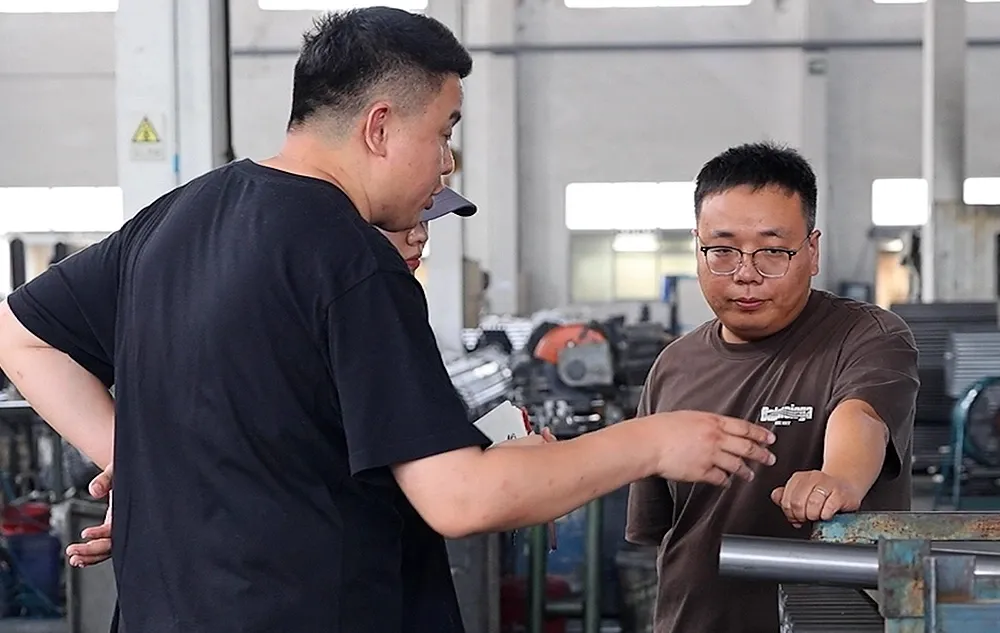precision steel tubes
Nov . 21, 2024 21:16
The Importance of Precision Steel Tubes in Modern Industry
Precision steel tubes play a crucial role in various industrial applications, thanks to their exceptional strength, flexibility, and adaptability. Unlike conventional steel tubes, precision tubes are manufactured with stringent tolerances, ensuring that they meet specific dimensional and performance standards. This article will explore the significance of precision steel tubes in modern industry, their manufacturing process, applications, and future trends.
Manufacturing Process
The production of precision steel tubes involves advanced techniques that ensure high dimensional accuracy and surface finish. The process typically begins with high-quality steel billets, which are heated and then formed into tube shapes using methods such as extrusion, piercing, or rolling. The formed tubes are then subject to processes like cold drawing or pilgering, which not only enhance strength but also refine dimensions and surface quality.
Cold drawing is particularly important in the manufacturing process as it reduces tube diameter while increasing length. This process allows for precise control of the tube’s outer diameter, wall thickness, and mechanical properties. Additionally, modern manufacturing techniques often include quality control measures such as ultrasonic testing, hydrostatic testing, and dimensional inspections to ensure that the products meet industry standards.
Applications in Various Industries
Precision steel tubes are utilized across a wide range of industries due to their remarkable characteristics. One of the prominent sectors is the automotive industry, where precision tubes are employed in the manufacturing of components such as chassis, frames, and exhaust systems. The high strength-to-weight ratio of these tubes improves vehicle efficiency and performance while ensuring safety and durability.
In the aerospace sector, precision steel tubes are critical for applications involving structural and hydraulic systems
. Their ability to withstand extreme pressures and temperatures makes them an ideal choice for components in aircraft and spacecraft, contributing to the overall reliability of these vehicles.
precision steel tubes
Furthermore, precision steel tubes are extensively used in the oil and gas industry. They are integral in pipeline construction, where they transport crude oil or natural gas over long distances. The robustness and corrosion resistance of precision tubes ensure the integrity of these pipelines, thereby reducing the likelihood of leaks and environmental hazards.
Additionally, the medical industry leverages precision steel tubes for manufacturing instruments and equipment. Surgical tools, as well as hollow tubes for implants and devices, benefit from the high precision and biocompatibility offered by specialized steel alloys.
Future Trends
The demand for precision steel tubes is anticipated to grow in the coming years, driven by advancements in technology and increasing applications across industries. One trend shaping the future of precision steel tubes is the growing emphasis on lightweight materials. With industries striving for energy efficiency, manufacturers are innovating to produce lightweight precision tubes that do not compromise strength and durability.
Another trend is the incorporation of smart technology into precision steel tube production. The use of IoT (Internet of Things) devices and sensors in manufacturing processes can enhance quality control and provide real-time data analysis. This could lead to improvements in production efficiency, reduced waste, and overall enhancement of product quality.
Moreover, sustainability is becoming a vital aspect of manufacturing practices. The steel industry is gradually moving towards greener processes, including recycling and the use of eco-friendly materials. Innovations aimed at reducing the carbon footprint of precision steel tube production will likely play a significant role in shaping industry standards in the future.
Conclusion
Precision steel tubes are indispensable components across various industries, offering significant advantages in strength, durability, and precision. Their manufacturing process, which emphasizes quality and stringent tolerances, ensures they meet the high demands of modern applications. As technology advances and industries evolve, the importance of precision steel tubes will only continue to grow, making them a vital focus for future innovation and development in manufacturing. Embracing emerging trends and sustainable practices will enable the industry to meet the challenges of tomorrow, securing a more efficient and environmentally friendly future.
 Afrikaans
Afrikaans  Albanian
Albanian  Amharic
Amharic  Arabic
Arabic  Armenian
Armenian  Azerbaijani
Azerbaijani  Basque
Basque  Belarusian
Belarusian  Bengali
Bengali  Bosnian
Bosnian  Bulgarian
Bulgarian  Catalan
Catalan  Cebuano
Cebuano  Corsican
Corsican  Croatian
Croatian  Czech
Czech  Danish
Danish  Dutch
Dutch  English
English  Esperanto
Esperanto  Estonian
Estonian  Finnish
Finnish  French
French  Frisian
Frisian  Galician
Galician  Georgian
Georgian  German
German  Greek
Greek  Gujarati
Gujarati  Haitian Creole
Haitian Creole  hausa
hausa  hawaiian
hawaiian  Hebrew
Hebrew  Hindi
Hindi  Miao
Miao  Hungarian
Hungarian  Icelandic
Icelandic  igbo
igbo  Indonesian
Indonesian  irish
irish  Italian
Italian  Japanese
Japanese  Javanese
Javanese  Kannada
Kannada  kazakh
kazakh  Khmer
Khmer  Rwandese
Rwandese  Korean
Korean  Kurdish
Kurdish  Kyrgyz
Kyrgyz  Lao
Lao  Latin
Latin  Latvian
Latvian  Lithuanian
Lithuanian  Luxembourgish
Luxembourgish  Macedonian
Macedonian  Malgashi
Malgashi  Malay
Malay  Malayalam
Malayalam  Maltese
Maltese  Maori
Maori  Marathi
Marathi  Mongolian
Mongolian  Myanmar
Myanmar  Nepali
Nepali  Norwegian
Norwegian  Norwegian
Norwegian  Occitan
Occitan  Pashto
Pashto  Persian
Persian  Polish
Polish  Portuguese
Portuguese  Punjabi
Punjabi  Romanian
Romanian  Samoan
Samoan  Scottish Gaelic
Scottish Gaelic  Serbian
Serbian  Sesotho
Sesotho  Shona
Shona  Sindhi
Sindhi  Sinhala
Sinhala  Slovak
Slovak  Slovenian
Slovenian  Somali
Somali  Spanish
Spanish  Sundanese
Sundanese  Swahili
Swahili  Swedish
Swedish  Tagalog
Tagalog  Tajik
Tajik  Tamil
Tamil  Tatar
Tatar  Telugu
Telugu  Thai
Thai  Turkish
Turkish  Turkmen
Turkmen  Ukrainian
Ukrainian  Urdu
Urdu  Uighur
Uighur  Uzbek
Uzbek  Vietnamese
Vietnamese  Welsh
Welsh  Bantu
Bantu  Yiddish
Yiddish  Yoruba
Yoruba  Zulu
Zulu 












